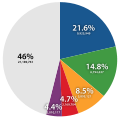Lee (Korean surname)
Lee or I (이) is the second most common surname, or family name, in Korea. In 2015 more than 7 million people in South Korea had this name. That is over 14% of all people in the country.[2]
|
Lee | |
|---|---|
 The one hanja for Yi | |
| Meaning | *리 or 이[1]
|
| Language of origin | Korean |
| Popularity | Behind the Name |
| Wikipedia articles | All pages beginning with Lee |
| Yi (Ri) | |
|---|---|
| Hangul | 이 (리) |
| Hanja | 李, 異, 伊 |
| Revised Romanization | Lee, Li, Yi, I, Ri |
| McCune–Reischauer | Lee, Li, Yi, I, Ri Note: "李" is officially romanized as I in South Korea and Ri in North Korea. |
Lee (Korean Surname) Media
A memorial for the founder of the Gyeongju Yi clan
The Jeonju Yi family performs rites (jongmyo jerye) to honor their ancestors in an annual ceremony which has been declared an Intangible Cultural Heritage by the Korean government.
References
- ↑ 리(Ri) in North Korea and 이(I) in South Korea. However, 이(I) in South Korea use 리(Lee) as their official English surname.
- ↑ "2015년 인구주택총조사 전수집계결과 보도자료" [Results of the 2015 Census of Population and Housing survey]. Korean Statistical Information Service. Retrieved 28 May 2019.




